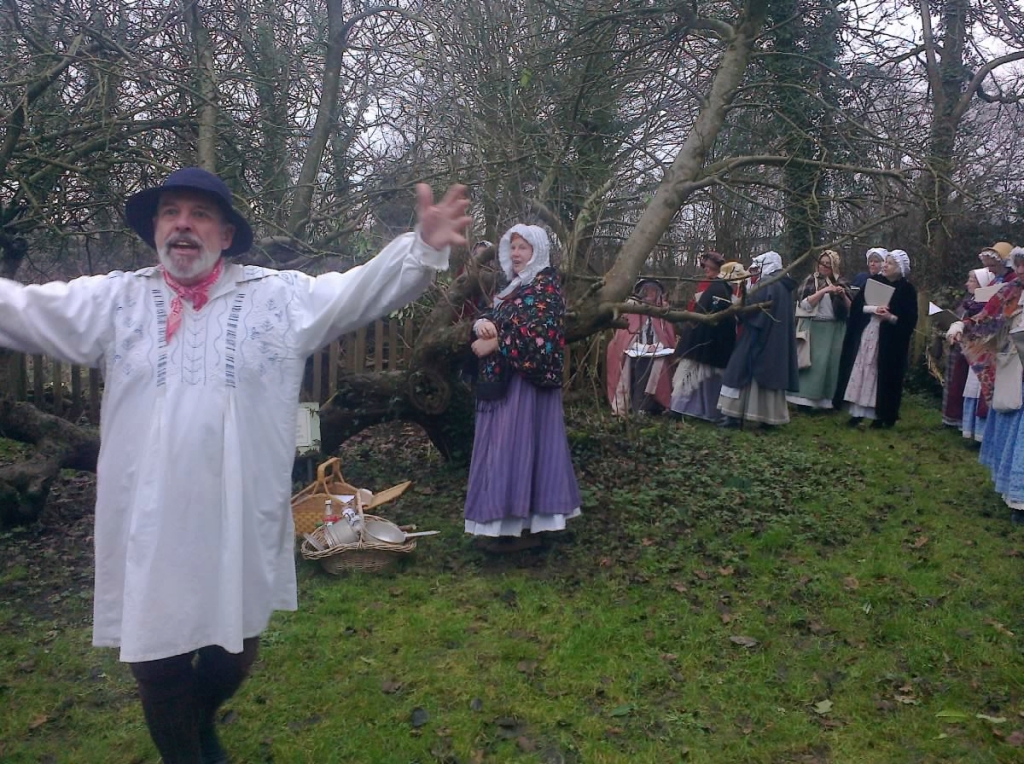
Wassailing, an ancient custom from Saxon times to give blessings of good health over the twelve days of Christmas, is making something of a come-back.
Traditionally, livestock, crops and farm machinery were blessed as well as people. Blessings were taken from door to door. In Scotland and the North of England this is known as First Footing in the New Year. The Lord of the Manor would give food (figgy pudding) and drink to peasants who worked on his estate in exchange for their blessing and goodwill.
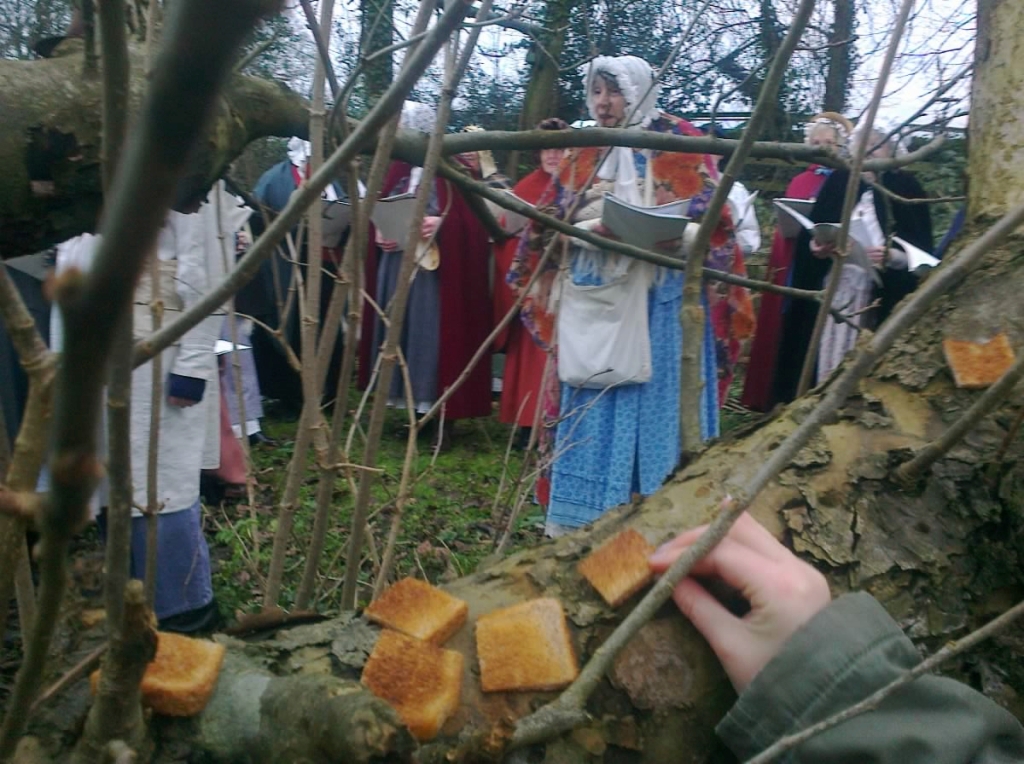
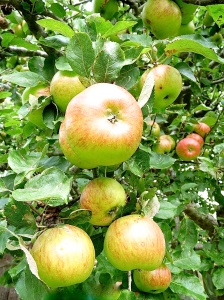 This was the forerunner of carolling – considered too rowdy to be done in church and also the forerunner of trick-or-treating in America, as Halloween was the original New Year’s Eve in the Celtic calendar.
This was the forerunner of carolling – considered too rowdy to be done in church and also the forerunner of trick-or-treating in America, as Halloween was the original New Year’s Eve in the Celtic calendar.
“Love and joy come to you,
And to you your wassail too;
And God bless you and send you
a Happy New Year”
Another example of a carol originating from wassail is “We wish you a Merry Christmas” (see Advent 15)
In the Southern shires of England – apple wassail blessings were to ensure a good crop for cider, especially in Kent which produces the best apples for commercial cider, and in the south-west for Scrumpy. English writer Thomas Hardy wrote about wassailing in his books and short stories set in Dorset ensuring that the custom has never died out there. The proceedings for apple wassailing are led by a Wassail King through the orchard, toasting trees and pouring cider on the roots:
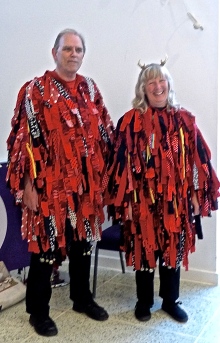 Hampshire Wassail Rhyme:
Hampshire Wassail Rhyme:
Stand fast root, bear well top.
Pray God send us a good howling crop
Every twig, apples big. Every bough, apples enow.
Hats full, caps full, Tall quarter, sacks full.
Huzzah! Huzzah! Huzzah!
Cider is drunk, songs are sung and drums, sticks, rattles and bells are beaten to drive away bad spirits and encourage the trees to give a good harvest.

Mummers plays, about the Good fighting off Evil, are often performed at apple wassails too. These were known throughout the UK and Ireland and were even taken to Newfoundland with The Pilgrim Fathers. Though kept in much of Wales, the festivals elsewhere gave way to Morris dancing in England, sword dancing in Scotland and pantomime (see Advent 8) just about everywhere. Raggedy characters (literally in costumes made from rags) introduce themselves in rhyming couplets:
Policeman Plod: ‘Ello, ‘ello, ello. In comes I, Policeman Plod.
Jack the Sniffer: You’ll never catch me you silly old sod. (He exits)
Betty Bertha: He’s gone off and scarpered all hurt and affronted
You’ve poked your nose in where it’s not wanted.
Mummer-characters have been Christian crusaders versus Moors, St George (Prince George or King George) and the Dragon, Beelzebub, Dracula, Robin Hood and the Sherif. But secondary characters kept in these plays included Olde Father Christmas and The Fool. These were obviously continued in our pantomimes.
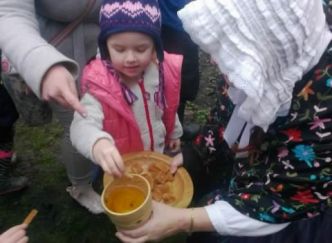
Wassail also refers to the spiced-cider punch in the wassail-bowl. There are many recipes, which you can find online, but I use beer (left-over and flat) along with fizzy cider and a small cup of brandy in a slow-cooker. Throw in some brown sugar, the juice and rind of a clementine or two, a squirt of lemon, some apples quartered (pips & stalk removed) and Christmas spices such as ginger, cloves, cardamom and a few sticks of cinnamon. It makes the house smell lovely and is a warm welcome for guests coming in from the cold.
All photos © Southampton Old Lady
I don’t think I knew any of this! Loving this series of posts.
LikeLiked by 3 people
Thank you Lamputts
LikeLiked by 2 people
Thank you for relaying these traditions and rituals relating to the celebration of holiday customs. It’s very interesting and informative. Your particular cider recipe sounds delightfully delicious.
LikeLiked by 3 people
You are welcome Randy – the punch is great for cold days.
LikeLiked by 2 people
Mummers are great. It’s been a while since I’ve seen a mummers’ play. The ones I’ve seen have tended to be about St George and the Turk, with frock-coated doctors. Scary, but fun.
LikeLiked by 2 people
I think perhaps the doctors were adopted later from Molière who targeted ‘quacks’.
LikeLiked by 1 person
Excellent explanation, Sol
LikeLiked by 2 people
Thank you Derrick
LikeLiked by 1 person
Hi SOL,
Thank you for the detailed description of these interesting and odd festivities. Having such celebrations add valuable intangibles to our lives, and bring people together who might otherwise not meet, or might not meet as regularly.
And a definite bonus is the opportunity to spend time in a natural setting.
As these are historical practices, I was swept away to a place where I imagined living in the Druid, Viking, Celtic, or Roman-era British Isles — no central heating, no motorized transportation, no technology, and always, always! at the mercy of the elements, whether for the seasonal crops that sustain humans through the winter and spring, or the biting winter cold. Such dedicated to their cause and hardy people! You and other Britons are both standing on their shoulders, “Propter eos autem.” and you *are* them.
Best regards, JBS
LikeLiked by 2 people
“Quia ex ipsis beati simus.”
Cheers! JBS
LikeLiked by 1 person
What a great thing to say JBS! Thank you
LikeLiked by 1 person
Thank you so much for sharing your gifts with us! This post is awesome both in terms of writing and the pics. As I mentioned before, I read your blog and allow myself to fell like I’m on a mini vacation!
LikeLiked by 2 people
Happy Holidays – you are welcome to drop by anytime…
LikeLike